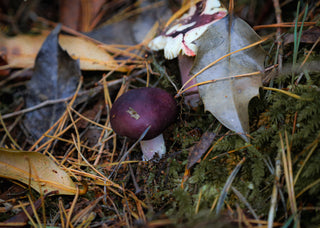It’s taken me a while to understand, but mushroom foraging isn’t really about the mushrooms—it’s the exact kind of excuse we adults need to go on a fun treasure hunt.

One evening this week after dinner, our 8-year-old daughter asked me why her 3-year-old sister got to call what she does at preschool “work.” To her, it was obvious that her little sister spends her mornings drawing, painting, and playing with friends—not exactly what you’d call work, right? As she wrestled with multiplication and spelling words like “squash” and “squabble,” she couldn’t believe that her little sister’s playtime could be called “work.” Clearly, she thought this was watering down and devaluing her own schoolwork.
As we chatted, I was standing at the sink, hands in warm soapy water, scrubbing away at a stubborn pot, while she was finishing her homework at the kitchen table. She pushed her colouring pencil across the page, venting her frustrations and explaining to me what she thought really counts as work.
I couldn’t help but smile to myself at this set-up, charmed by her seriousness, when a thought hit me. “Actually,” I interrupted, “I think it’s us adults who have the wrong idea.”
She looked up, curious.
“I think we send children a message, as they get older, that play isn’t serious or important—when, actually, it is. Play is serious work.”
Now she was all ears.


“Somehow, we grown-ups have decided that work is ‘serious’ and play is ‘for children.’ But really, play is when we’re learning, trying out new things, experimenting, listening, watching to see what happens... It’s not that kids need to work more—we adults need to play more.”
She raised an eyebrow. “Then why don’t you?”
I smiled. “We’re… not very good at giving ourselves permission.”
“Why not?” she prodded.
“I’m not sure... We tell ourselves— and you —that we don’t have time,” I said. She nodded like she’d heard that one before.
“Maybe,” I added, “we think we’re supposed to know everything already, and we’re afraid to admit we don’t.”
She clearly enjoyed this answer.
“Or maybe,” I went on, “we’re afraid of open-ended things. Have you noticed? We always need a plan, a goal, a destination—some purpose or reason.”
She gave me a funny look, like she wasn’t quite sure what I meant.
“Think about it. Your Dad and I don’t just go outside and play, like you three do. We always have to have a ‘purpose,’ like your Dad going fishing or us saying we’re going to pick blackberries or mushrooms.”
She rolled her eyes. “Yeah,” she groaned with a smile.
“I think fishing is just your Dad’s excuse to stand in the river all day,” I said. “Imagine if he didn’t bring a fishing rod... People would think he was so weird—just standing there in the river for hours, doing nothing.”
We both laughed. “Maybe that’s exactly what he does,” she said with a grin. “He just stands there in the river for the day!”
“Or when we go mushroom foraging,” I continued. “It’s really just an excuse to spend the morning rummaging in the woods—kicking up leaves, poking at strange things with a stick, exploring. It’s basically playing. But when we say ‘mushroom foraging,’ it gives us permission. It’s like our way of saying to other adults, ‘Don’t worry, we’re not weird for crawling around the forest floor—it’s okay—we’re looking for mushrooms!’”
She laughed and closed her book. She was done with the conversation. She left her schoolwork spread across the table and sloped off to join her younger sister and brother, who were busy building a block tower in the other room.

As I moved from washing dishes to sweeping the floor, I thought back to our last Sunday morning spent mushroom foraging together. We’d planned to gather a big haul of wild mushrooms, but, as usual, came back with just a handful of chanterelles and some funny little “hedgehog” mushrooms.
But if we’d just been on a regular walk, we’d have missed so much—the badger’s den, the red fox fur caught between two trees, the single beech nut spinning in the air, suspended on an invisible spider thread. There we all were, on a Sunday morning, sticks in hand, crawling around in the woods, watching the natural world up close, totally absorbed in the life on the forest floor.


In the next room, I heard the block tower crashing down to the floor, followed by screeches and screams of delight.
Then it strikes me ... the real reason we adults are afraid to play ... we are afraid to fail at things.
One of the things that I love about mushroom foraging is that it gives you an excuse to rummage through the leaves, to take your time in the forest. But I also love that the stakes are so low, very often we fail completely at finding any mushrooms. Often we come home empty handed, and yet, somehow, it doesn't seem to matter.
"That is because mushrooms are not the point!" I finally realise. The real prize is the treasure hunt itself: the time spent together, the permission we give ourselves to play, to explore, to fail and to watch with wonder.
________________________________________________________________________
Words: Jo Anne Butler
Photographs: Gearoid Muldowney




